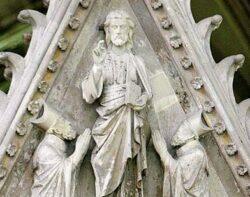St. Denis, or Dinis, bishop of Paris was beheaded along with the priest Rusticus and the deacon Eleuterius on the hill of Montmartre, on the outskirts of that city.
Newsroom (11/10/2022 8:30 PM, Gaudium Press) Saint Denis, or Dinis, was sent to Paris, becoming the first bishop of France. A remarkable preacher, he converted hundreds of people. His success provoked the anger of the local pagans and he was taken prisoner by the Roman governor. He was martyred along with St. Eleutherius and St. Rusticus in the persecutions of Emperor Valerian for not denying his faith.
A French writer, in a short story[1], imagines how it all happened. Let’s see.
The Executioner of Saint Denis
“Peace be upon you!”
With this sentence the small and nice dark-haired Laertia greeted her husband, the blond and giant Tubaldus, who jumped out of bed grumbling, because he did not like this greeting.
“Ah, who thinks of disturbing the peace? Tomorrow, the enemies of our Emperor Domitian will reach Lutetia (Paris). You would do better if you resorted to Mercury (Roman god) or Wotan (German god) to make me earn money at the fair today.”
Tubaldus was silent; his mouth was not used to making such long speeches about politics, strategy, and religion since it served another purpose: he swallowed swords. He practiced his art at fairs or sometimes in private sessions, in the lobby of some Roman official or in the villa of some wealthy Parisian, around Lutetia.
Saddened by the rude welcome of her husband, whom she loved despite his brusqueness, the gentle Laertia hastened to serve him his morning meal: four trout in butter, two slices of pork liver, a plate of roasted potatoes, goat’s milk cheese, and thick slices of bread.
Laertia knew that to swallow swords, one must not have a heavy stomach. But it is not easy to carry the stomach of a man the size of Tubaldus, who has to travel more than two kilometers on bad roads to get to work.
“What a morning! There will be a lot of people at the fair in Lutetia today, and I’m told that Magistrate Fescennius will hold a trial,” he commented as he ate.
At these words, Laertia raised her head.
“Who will be judged?” – asked Laertia, showing concern.
“There is no lack of evildoers in Lutetia! Well, maybe some more of those Christians will be judged?”
“Christians? What harm do they do?”
“They refuse to sacrifice to the gods,” replied Tubaldus.
“But why can’t they remain faithful to their God?”
“And what harm would it do for them to throw a few grains of incense before Jupiter or Mercury? I do it, and yet, Wotan, who is my god, doesn’t mind…”
Tubaldus hugged his wife and left. He had to hurry, because he was late. Left alone, Laertia went to kneel in a corner of the room, in front of a column on which a crude image was carved. Unbeknownst to her husband, she was a Christian.
The Lutetia Fair
Tubaldus walked quickly, for he had a long distance to travel to Lutetia. When he arrived, the huge square in front of the temple of Mercury (god of commerce) was full of market traders, buyers, and onlookers.
It was the most incredible fair imaginable! There were bear tamers in between with vendors selling all sorts of objects, jugglers, singers, dancers, magicians, pythons. All shouting at the same time, to attract the attention of eventual customers.
Tubaldus was upset, for he had arrived late and could find no place to exercise his skills. But his friend Bela, the bear tamer, had reserved him a good space next to the first step of the temple staircase. There could be no better place!
Tubaldus’ profession
Happy and excited at the prospect of a profitable day, the blond giant announced the beginning of his show.
While, at the side, Bela made her trained bears dance, Tubaldus… swallowed swords. As soon as he had swallowed the first few, several coins were thrown on his cloak lying on the slab.
The sun was not yet at the peak of its course and Tubaldus had already accumulated a fairly comfortable amount of bronze or copper money, when the sound of trumpets announced the arrival of the prefect.
Fescennius, a small, fat, lazy man, painfully climbed the path leading to the temple.
Standing before the temple steps, he briefly observed the blond giant standing in front of him.
“Hrmph, big man, this one!” – he grumbled moodily.
“He’s the knife and sword swallower. Would you like to see him work?” asked an official.
Fescennius nodded.
Tubaldus gave a demonstration of his art. Roman gaols, Dacian sabers, Germanic swords – everything disappeared into his prodigious throat.
Fescennius seemed interested. And with his fat hand, he threw a large silver coin at Tubaldus’ feet. The prefect’s followers imitated this gesture. Silver coins rained down on Tubaldus’ cloak, making him radiant with joy.
The martyrdom of Saint Denis
Fescennius climbed the temple steps and sat down in the chair brought by the slaves. A portable altar topped by a statuette of the god Mercury was placed to his right, and on this altar an aromatic wood fire sent spirals of fragrant smoke into the sky.
At his signal, the crowd fell silent. A powerful-voiced official read the Emperor’s decree ordering the elimination of all Christians from the territory of Lutetia.
From the temple where the prisoners were being held, the guards brought out three men loaded with irons. Two of them, richly dressed, were important people in the city. The third, a thin, erect old man with a white beard, wearing a long linen robe, was Bishop Denis.
The first two, although sincere Christians, were weak. To save this ephemeral life and conserve earthly riches, they burned incense to the idol and left, laden with remorse.
Now it was the turn of Bishop Denis. Calm and collected, staring into the distance with his clear eyes, he didn’t even seem to hear the magistrate’s repeated cries ordering him to sacrifice to the idol.
Enraged, the magistrate shouted with astonishmen: “Sacrifice! If not, you will die immediately, and all your goods will be confiscated!”
“I am a Christian! I will not sacrifice to your false gods. I will die with joy confessing the name of Jesus Christ. As for my goods, they are not of this world, you cannot confiscate them,” he answered.
Turning to the guards, Fescennius ordered the execution right there and then of the venerable old man, who was standing at the top of the stairs, while everyone was agitated around him, due to an unforeseen fact: the executioner was also a Christian? and had fled so as not to be forced to behead his bishop!
In an extreme rage, the high magistrate looked for a replacement for the inglorious task, but everyone shied away. Finally, his gaze fell on Tubaldus:
“You swallow swords, do you know how to use them?”
“It’s not my job, sir,” he replied.
“What does it matter? It’s an order!”
“I am a free man.” Tubaldus replied calmly.
Red with anger, Fescennius shouted at the guards:
“Take this dog, and if he doesn’t obey, hang him from the first tree and kill him with spears!”
The guards rushed at Tubaldus and dragged him to the top of the stairs. He felt all the formidable power of the Roman Empire against him. He seemed to be in a nightmare. He saw his wife’s fearful face, looked at the respectable old man with his head on the wooden stump, felt Fescennius’ fury. But… if he didn’t kill, he would be the one to die!
An angry voice made the guards surround him with their spears, ready to deliver the mortal blows to him if he did not immediately comply with the order received. Tubaldus then delivered the fatal blow. With his eyes wide open, he saw the blood spurting out, and followed the martyr’s head rolling on the ground.
“There it is for you!”said Fescennius, throwing him a bag full of coins.
Tubaldus’ Conversion
The impromptu executioner did not take the bag. He dropped his sword and ran, stopping only when he reached his house. There, he fell to his knees, his hands still stained with blood.
“I have killed a righteous man! I killed a saint!”
Finally, his wife managed to calm him down and, very moved, he told her everything. It was already late at night and the unhappy man never stopped lamenting:
“I killed a righteous man! I will be punished!”
Suddenly, a soft and sweet melody was heard in the house from outside. Surprised, the two men approached the window and saw, in the distance, a faint light advancing towards the house. To Laercia’s surprise, her husband turned pale, stepped back and shouted:
“It’s him! I will be punished!”
What was happening was at once terrible and wonderful. A human figure, surrounded by light, was advancing across the field. Approaching the house, without anyone opening the door, it entered the room, which was suddenly illuminated. The two of them fell to the ground. Before them stood the body of Bishop Denis, holding his severed head in his hands, his eyes closed as if in a restful sleep. Then his lips opened and he uttered these words
“Tubaldus, I forgive you!”
Then the bishop stepped forward again, put his head in front of the pillar that served as an oratory for Laertia, and finally lay down like a real dead man. Turning to Laertia, Tubaldus said:
“I, from this day on, want to be a Christian!”
Laertia, overcome with emotion, exclaimed:
“I have long been a Christian and have prayed for your conversion. Peace be with you!”
They both hastened to bury the martyred bishop in his own house.
In the year 650, King Dagobert erected a basilica called Saint Denis (Saint Denis) on this site. The hill where his head was cut off became known as “Le Mont des Martyrs”, today Montmartre, in Paris.
Text adapted from the magazine Heralds of the Gospel, May 2004.
[1] QUINEL, Charles; MONGON, Adhémar. Conts et legends de Paris et de Montmartre. Fernand Nathan (ed). Paris, 1962.

































